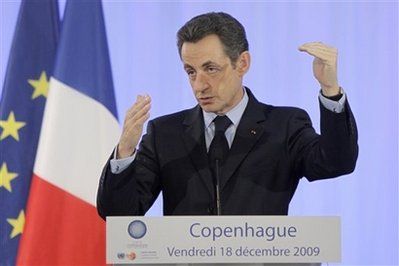
[Guardian Unlimited, U.K.]
Le Monde, France
Copenhagen Climate
Talks: 'Failure and Disappointment'
"In
today's world, when it comes to questions of the magnitude of the climate, if
there isn't a preliminary agreement between China and the United States - the
famous G2 - nothing significant is going to happen."
EDITORIAL
Translated By Philippe Guittard
December 19, 2009
France - Le Monde - Original Article (French)
It's difficult to hide the profound sense of disappointment.
Difficult not to get the impression of a failure that will have serious
consequences - a failure in regard to what should have been at the heart of the
two week U.N. conference convened in Copenhagen which ended Saturday, December
19: the fight against global warming. Nothing less, in fact, than the
preservation of the state of the planet for future generations.
Posted by WORLDMEETS.US
But such is the
dominant reaction in Europe - that of a failure to the pessimist and a
half-failure to the optimist. Meanwhile, some of the 192 countries at the
meeting at Copenhagen have yet to receive, in plenary session, the minimal text
concocted by a score of them.
The diagnosis was
quickly arrived at: in the negative. This text doesn't even address the overall
objective for which the conference had been arranged - by 2050, to reduce
greenhouse gas emissions to 1990 levels. In the opinion of a majority of
experts, only this level of reduction will keep overall global warming under
two percent from now to 2050. However, the consequences of anything beyond 2
percent are likely to be devastating …
The text merely
records the commitments of individual states to reduce their emissions of
greenhouse gasses. It's based on the honor code and declarations of intent. It
isn't a precise and binding document. Neither does the text incorporate the
idea of a global environmental organization charged with responsibility for
ensuring a modicum of control over CO2 emissions.

French
President Nicolas Sarkozy exhorts his fellow world leaders to act,
at
the Climate Summit in Copenhagen, Dec. 18. [Click here
or click photo to watch
speeches by Chancellor Angela Merkel; Iran President
Ahmadinejad;
Brazil President Lula; and French
President Sarkozy.]
osted by WORLDMEETS.US
So what happened? Europe defended its ambitious objectives
but didn't know how - or was unable - to close the divide. It was marginalized
by a coalition that is a testament to the distribution of political power in
today's world: the United States, China, India, Brazil and South Africa. China
is at the heart of the failure of Copenhagen. For reasons of economic
competitiveness, Beijing doesn't want to impose overly-restrictive
environmental standards on its industrialists. But much more important than
that, China doesn't support the idea of international controls over it.
In today's world,
when it comes to questions of the magnitude of the climate, if there's not a
preliminary agreement between China and the United States - the famous G2 -
nothing significant is going to happen. Even less so, if it falls to 192
nations to decide under an unworkable and inappropriate U.N. procedure like
the astonishing free-for-all that just ended in Copenhagen.
CLICK HERE FOR FRENCH VERSION
Posted by WORLDMEETS.US, Dec. 19, 10:22pm